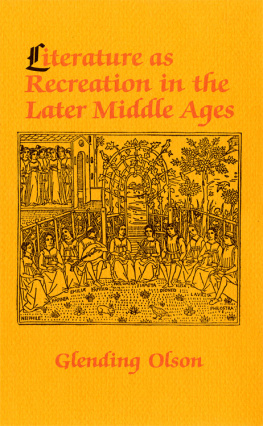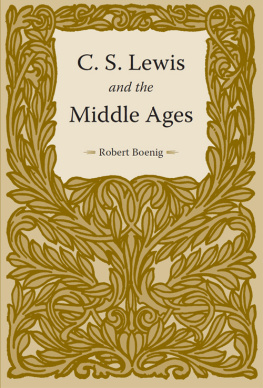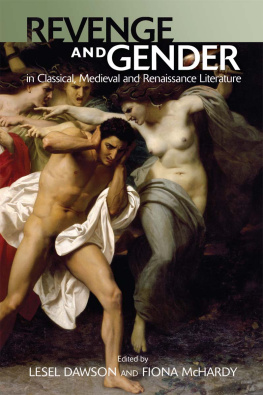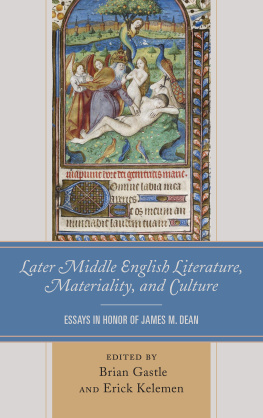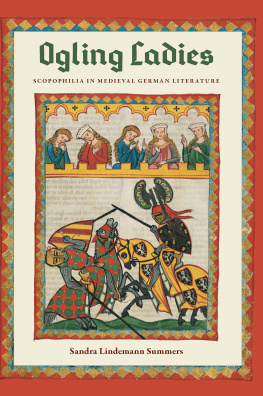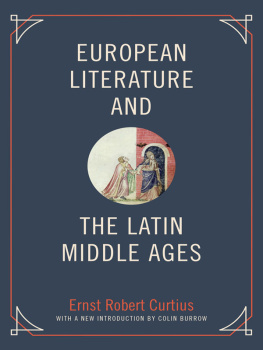Abbreviations
| Archiv | Archiv fr Geschichte der Medizin |
| BHM | Bulletin of the History of Medicine |
| CFMA | Les Classiques Franais du Moyen Age |
| EETS e.s. | Early English Text Society, extra series |
| EETS o.s. | Early English Text Society, original series |
| SATF | Socit des Anciens Textes Franais |
| SP | Studies in Philology |
| ST | St. Thomas Aquinas, Summa Theologiae, Blackfriars text and trans., 60 vols. New York: McGraw-Hill, 1964. |
Medieval Attitudes toward Literary Pleasure
Literature gives pleasure. From Platos recognition of Homers power to charm and enthrall to Roland Barthess The Pleasure of the Text, critics and theorists of literature have always acknowledged its capacity to give delight. There is even more persuasive evidence from a larger audience, the people who in the Middle Ages listened to minstrels tell stories, who in the Renaissance made Shakespeare a commercial success, who in the nineteenth century waited for the next installment of Dickens, and who today buy paperback editions of Harold Robbins or Joseph Heller. Although to some extent literary enjoyment remains suspect even now, we have a fully institutionalized, philosophical rationale for it: a separate intellectual category of aesthetic pleasure that makes the experience of works of art a valid mode of knowledge in itself. And if such academic approaches usually restrict themselves to only the best literature, we have another category, popular culture, for explaining the psychological, sociological, and even artistic satisfactions that obtain from movies, television, and formula fiction. In general, gaining pleasure from works of art seems a decent, even laudable, activity.
In the Middle Ages, according to the conventional wisdom, such was not the case. The early Christian hostility to pagan culture, and hence to classical poetry, resulted in the most cautious and restricted acceptance of literature. Throughout the period the emphasis in literary theory and in the justifications put forward by the works themselves is not on the pleasure poetry provides but on the moral benefit it bestows. This exemplum is worth hearing because it teaches you about the dangers of avarice. This ancient story is worth reading because it depicts virtuous actions you should imitate. This pagan fable, which if taken literally involves immoral acts by gods, has an allegorical meaning that is consistent with natural or religious truth. Literature becomes the servant of Christian morality and faith. To respond to a text only for the pleasure it gives is to misspend ones time; the pleasure, rather, should lie in the satisfactions of using literature to further ones understanding of right action or right belief.
No one should deny that such attitudes existed, and dominated, in the Middle Ages and that many important artists and thinkers held them, as we will see shortly. But I want to begin this survey of medieval views of literary pleasure not with statements about what literature should do but with a very broad generalization about what in fact it does. Medieval understanding of the function of poetry depended to a large extent on these lines from Horaces Ars poetica:
Aut prodesse volunt aut delectare poetae
aut simul et iucunda et idonea dicere vitae.
quidquid praecipies, esto brevis, ut cito dicta
percipiant animi dociles teneantque fideles:
omne supervacuum pleno de pectore manat.
ficta voluptatis causa sint proxima veris,
ne quodcumque velit poscat sibi fabula credi,
neu pransae Lamiae vivum puerum extrahat alvo.
centuriae seniorum agitant expertia frugis,
celsi praetereunt austera poemata Ramnes:
omne tulit punctum qui miscuit utile dulci,
lectorem delectando pariterque monendo.
Poets aim either to benefit, or to amuse, or to utter words at once both pleasing and helpful to life. Whenever you instruct, be brief, so that what is quickly said the mind may readily grasp and faithfully hold: every word in excess flows
The first two lines are probably the most familiar literary commonplace in the Middle Ages, and line 343 often accompanies them. I have cited the entire passage so that we can see what Horace means when he talks about the different poetic goals. Having posed three literary intentionsprofit, pleasure, and the combination of the twohe first takes up the matter of instruction. That which profits in poetry should be briefly but clearly stated; Horace seems to be thinking in terms of straightforward moralizing here, points stated rather than dramatized, what Brink calls the teaching of lessons (Prolegomena, p. 263). Lines 33840 give advice on the second goal: literary pleasure comes from a verisimilar fiction, not from fairy-tale exotica. The rest of the passage points to the superiority of the third kind of poetic work, that which combines pleasure and profit: it will appeal to both old and young, bringing, as Horace goes on to point out, fame to its author.
Certainly the Ars poetica intends the third kind of poetry to be valued most. But the firm categorizing oflines 33334, emphasized by the three auts, and the repeated use of words that denote one or the other poetic goal (delectare, iucunda, voluptatis causa, dulci, delectando versus prodesse, idonea ... vitae, praecipies, utile, monendo) contribute to the likelihood of the passages being taken more descriptively than prescriptively. Quoting line 333 by itself, as medieval texts The very fact that Horaces literary ideal combines the two functions suggests an understanding of fiction that is inherently dualistic; it is one that does not substantially change until the emergence in recent centuries of a conception of aesthetic experience more Aristotelian than Platonic or Christian in its willingness to accord works of art an independent status as a form of human understanding.
Accordingly, one strain of medieval literary thought developed by taking the distinction between pleasure and profit as a means of justifying fiction by its conformity to moral and religious truth. Delectare became the function of the narrative surface, prodesse the function of the spiritual truth embodied in the fiction. A medieval commentary on Statius known as On the Thebaid, attributed to Fulgentius the Mythographer but probably written some centuries later, makes explicit the allegorical use of Horace:
I take up again, with great respect, that knowledge deserving of scrutiny and that inexhaustible vein of intellect found in those poets who, under the alluring cover of a poetic fiction, have inserted a set of moral precepts for practical use. For when Horace testifies that poets seek to instruct or delight,
The commentary goes on to compare a poem to a nut, its literal meaning like a shell one needs to break in order to get to the desirable kernel of allegorical truth. A child is happy to play with the whole nut, but a wise adult breaks it open to get the taste. The analogy not only delineates the sources of pleasure and profit but ranks the two poetic functions: being content with surface delight alone is childish play, seeking the inner wisdom is properly mature activity.
D. W. Robertson, Jr., has firmly established that such a conception of poetry was pervasive in the Middle Ages. other ideas seems to me undeniable, and this book is about a few of them. It is meant not to refute Robertsons assertions of a medieval theory of allegory but to suggest that there are limits to its applicability, that the belief in a single medieval way of responding to literature is unwarranted, and that accordingly the judicious use of medieval literary thought in the interpretation of any individual work entails first establishing rather than assuming what critical ideas are most relevant to it.

